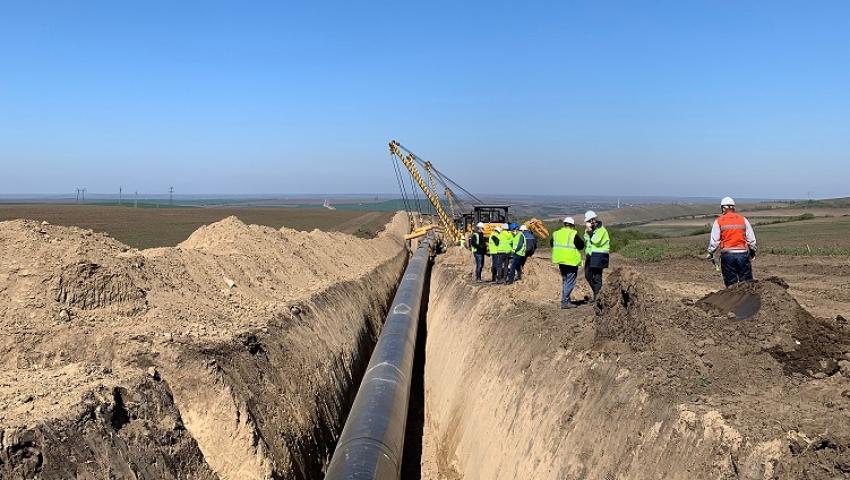Gazprom: Bulgaria delays Turkish Stream extension to Southeast and Central Europe
The new gas infrastructure in Bulgaria is more than half a year delayed

The completion of the construction of the new gas transmission facilities in Bulgaria, through which the gas from Russia through Turkey should reach Serbia and continue further, has been delayed for more than half a year.
If in the February memorandum for Gazprom's Eurobonds the completion of the construction of the receiving gas pipeline was expected in the first half of 2020, in the new prospectus (issued in October) the completion is expected by the end of 2020. According to Gazprom such are the promises of the Bulgarian side, according to the Russian news agency Interfax.
The Turkish Stream (TurkStream) pipeline directly connects the gas transmission system of Turkey and Russia and provides energy supplies to Turkey, Southern and Southeastern Europe. It will enable the supply of up to 31.5 billion cubic meters of natural gas per year to the region.
The sea section of the system consists of two parallel pipes running along the bottom of the Black Sea. The 930 km long offshore gas pipeline starts from the city of Anapa in Russia and reaches the coast (of the Black Sea) west of Istanbul, near Kyukyoi in Thrace. A pipeline from the onshore pipeline connects the offshore section with the existing Gur gas transmission system near the city of Luleburgas. The end point of the second pipeline is at the Turkish-EU border.
The Red line
The gas pipeline, which in Sofia is not called "Turkish Stream" but "Balkan Stream", is 474 km long, has a pipe diameter of 1,200 mm and must run from the Turkish border to Serbia. The total value of the contract is 1.1 billion euros (excluding VAT).
Bulgaria immediately put into operation the capacity that allows it to receive gas from the Turkish Stream (the capacity of the border with Turkey is 19.9 billion cubic meters per year), but there were difficulties (due to disputes over construction tenders) with the expansion of the gas pipeline to Serbia.
Serbia has long announced that it is ready to complete the construction of the 403km section of the Turkish Stream on its territory (with 12.88 billion cubic meters at the entrance and 8.6 billion cubic meters at the exit).
If in 2020 all suspensions related to the terms of the contracts can be attributed to the pandemic, then in 2019 the work could not start due to disputes between the builders. In April 2019, the gas transmission operator Bulgartransgaz held a tender for the construction of the Bulgarian section of the project. The winner was the consortium Arkad (Saudi Arkad Engineering & Construction Company and Italian Arkad ABB S.p.A.). But Arkad did not present all the necessary documents to Bulgartransgaz in time, so the second participant was announced - the consortium Gas Development and Expansion in Bulgaria (GDEB). Arkad filed a complaint against Bulgartransgaz's decision with the Commission for Protection of Competition. It was only in mid-September that the Supreme Administrative Court of Bulgaria terminated the procedure for appealing this public procurement and the company managed to sign a contract for the implementation of the project activities.
Hungary's national gas transmission operator, FGSZ, has launched preparatory work on the mandatory reservation of new gas transmission capacity on the route from Serbia to Hungary. The start of deliveries to Hungary is planned for the second half of 2021, and the reaching of the project capacity - in the second half of 2022, says the new memorandum of Gazprom.
A matter of policy
A year ago, in December 2019, the progress of activities on the territory of Bulgaria received a harsh political assessment from Russian President Vladimir Putin. As he said at a joint press conference with Serbian President Alexander Vucic, Bulgaria has deliberately delayed the implementation of the Turkish Stream project on its territory, despite assurances that it is interested in participating in gas projects with Moscow.
"Despite repeated assurances and despite numerous requests to the Russian side to ensure the supply of our gas through Turkey to Bulgaria, we see that the Bulgarian side, as sad and strange as it may sound, is deliberately delaying the implementation of the project on its territory," he said.
"I want to say this directly and publicly. Many times the Bulgarian government made a request after they failed South Stream to implement "Turkish (Stream)". Well, let's see how this project will continue to be implemented on Bulgarian territory. If the Bulgarians do not want ... well, not the Bulgarians, but the Bulgarian rulers, we will find other ways to realize our potential in Southern Europe, "Putin warned.
